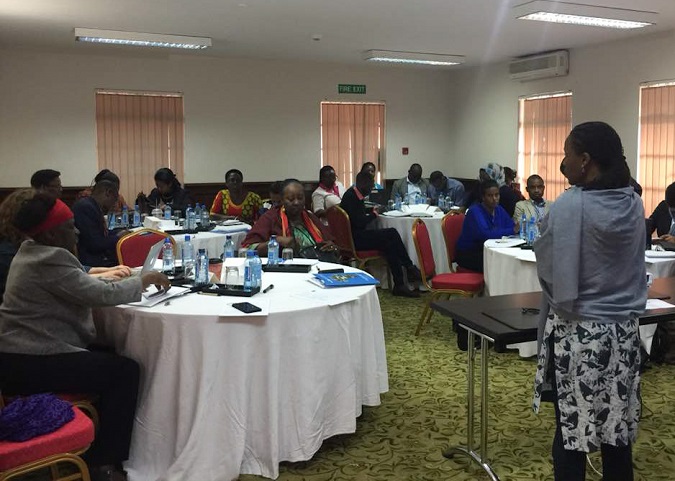UN Women conducts training on improving post recovery efforts
Date:

Globally, disasters are becoming much more frequent, with 1.5 billion people affected and 1.3 trillion USD in economic losses between 2005 and 2015. Sub-Saharan Africa is particularly vulnerable, with an average of 157 disasters per year in the same period, affecting a total of 180 million people.
Women and children typically are the most affected by disaster, and as UN Women it is crucial that we understand the nuances of how disasters impact women and girls differently than boys and men. The above statistics show the critical role that Post Disaster Needs Assessment (PDNA) plays in reaching the most left behind. It aims to analyze the gap between pre- and post-disaster development scenarios to shrink the gap that exists after disasters, providing an opportunity to identify vulnerabilities and apply lessons learned.
UN Women regional office for East and Southern Africa convened a workshop on PDNA to help build the capacity of UN Women’s staff relevant government entities and international NGOS, Civil Society Organizations (CSOs), partners in the region. This was planned with the goal of raising capacity on how to apply a standardized approach and methodology to conduct post disaster needs assessments, formulate a recovery strategy and plan for its successful execution. The training also aimed to strengthen their capacities to advocate for gender mainstreaming across all the PDNA sector. Not only did this training seek to provided participants with skills and knowledge to participate in the PDNA process leading to integration of gender issues; it also provided a platform to share good practices and lessons learned from the participants' experiences.
UN Women Deputy Regional Director Simone Ellis Oluoch-Olunya welcomed participants to the training and highlighted the importance of gender-responsive disaster risk reduction and response. ‘There is often a lack of understanding of differential impacts on women and men, substantive gender analysis, and gender disaggregated data. Existing assessment methodologies also tend to overemphasize the formal sector and the types of productive assets owned by men. Inadequate attention to informal sector activities and unpaid care work, which are disproportionately done by women, ignores the losses and opportunities affecting women in disaster situations’, highlighted Simone in her opening remarks.

The Post-Disaster Needs Assessment (PDNA) process offers an opportunity to address these gaps. The PDNA was adopted in 2008 by the UNDG, EU, and World Bank to harmonize existing frameworks to better support disaster response and recovery. It has since been used by several countries in ESA, for instance by Kenya to understand its needs for recovery from the severe drought of 2008-2011. As the PDNA is used nationally, regionally, and internationally, it is essential we have the skills to contribute to the process and ensure that gender equality and women’s empowerment is included in the assessment. The PDNA includes a chapter on gender, and UN Women has been called on to support countries in gender integration. For UN Women and partners to effectively provide that support, there is need to build human resource capacity.
At the end of the three-day training, some of the conclusions made centered around gender and its crucial inclusion into all other sectors chapters of the Post Recovery Needs Assessment, not just as a standalone chapter led by UN Women. In addition to gender, the chapter should cover other aspects of social inclusion relevant to the country context, such as child protection, disability, HIV/AIDS.